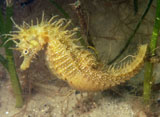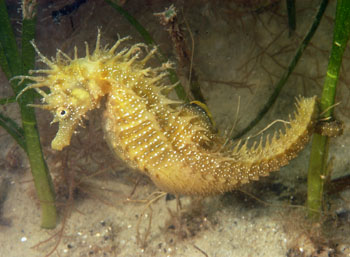Threat to seahorses
Native seahorses could be under threat from anchors churning up seagrass beds where they live in Dorset, in Studland Bay


Reports suggest that Britain's largest seahorse colony has been decimated by boats dropping their anchors. Studland Bay in Dorset has historically been home to the native spiny and short-snouted seahorses-five years ago, 40 pairs of the former species and one pair of the latter were recorded.

Long snouted seahorse
** Subscribe to Country Life; Country Life on Ipad
However, it's thought that anchors churning up the seagrass beds where they breed have caused a dramatic decline in numbers, and some conservationists say that the colonies have been wiped out. ‘We are aware that recent surveys have returned a negative result, but we have also received two separate reports of seahorse sightings in Studland Bay within the past fortnight, suggesting the picture is not clear cut,' explains a Natural England spokesman.
‘We are working closely with Defra and other organisations to help inform decisions on how the seagrass can be conserved.' The no-anchor zone that was introduced in the area several years ago is no longer in force.
* Follow Country Life magazine on Twitter
Image from: The Joint Nature Conservation Committee
Exquisite houses, the beauty of Nature, and how to get the most from your life, straight to your inbox.
Emma Hughes lives in London and has spent the past 15 years writing for publications including the Guardian, the Telegraph, the Evening Standard, Waitrose Food, British Vogue and Condé Nast Traveller. Currently Country Life's Acting Assistant Features Editor and its London Life restaurant columnist, if she isn't tapping away at a keyboard she's probably taking something out of the oven (or eating it).
